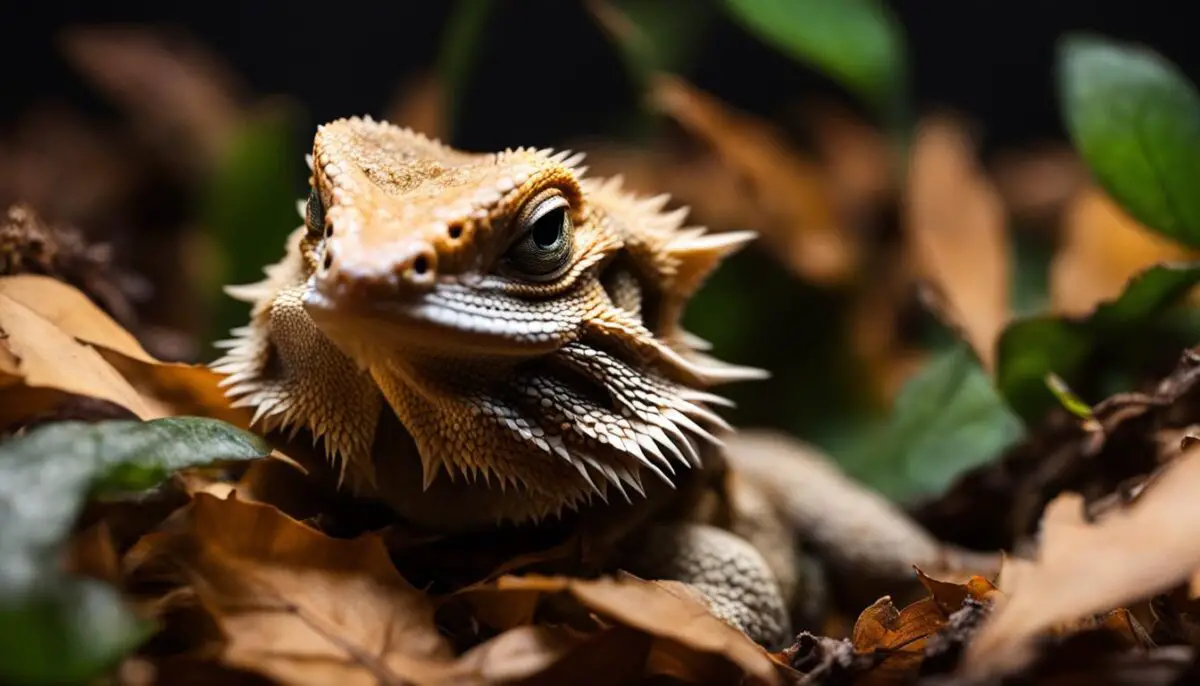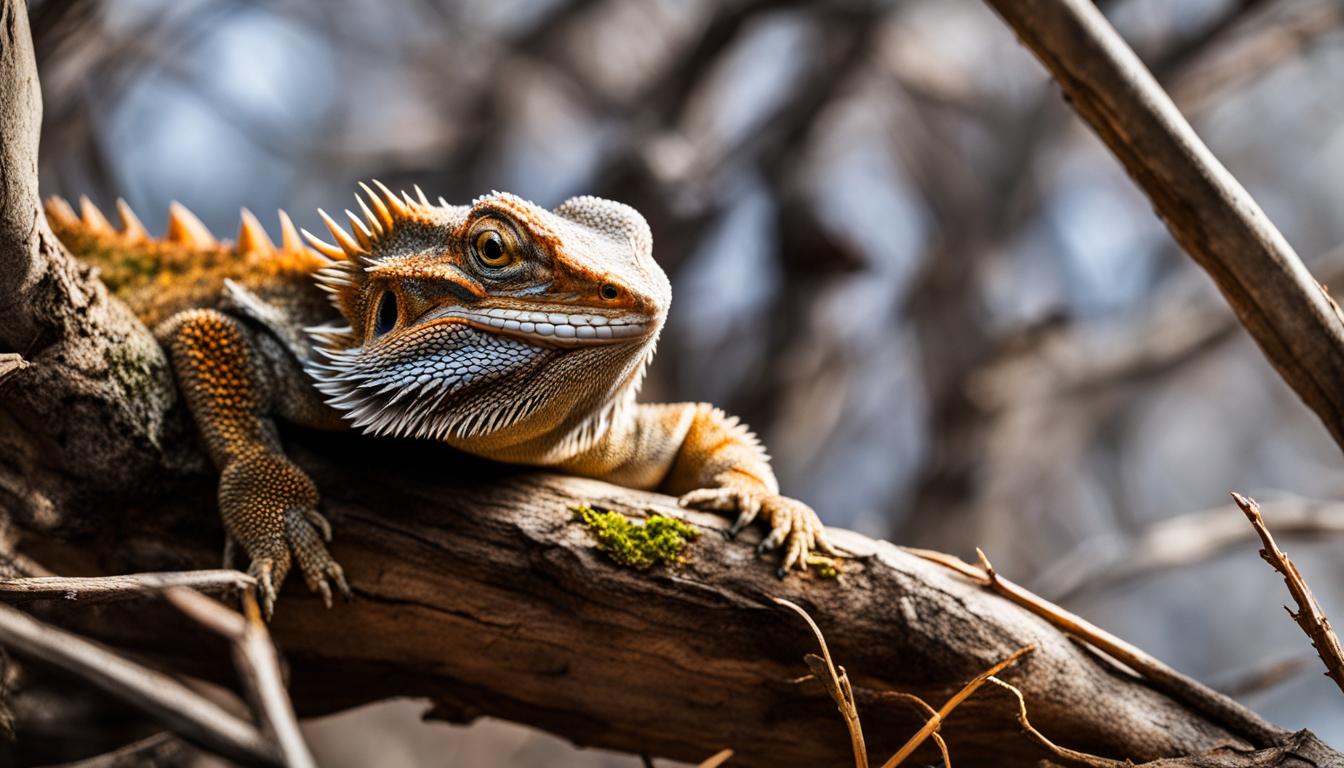Brumation is a natural process that many reptiles, including bearded dragons, undergo during the cold winter months to conserve energy. It is important to understand the signs of brumation to differentiate it from a potentially dead bearded dragon. Bearded dragons in brumation experience lethargy, loss of appetite, frequent hiding or burrowing, and disinterest in their surroundings. It is vital to monitor your dragon’s behavior and consult a vet if you are unsure. On the other hand, a dead bearded dragon will show no response, have a limp body and jaw, and partially closed eyes.
Key Takeaways:
- Brumation is a natural process that bearded dragons undergo during the winter months to conserve energy.
- Signs of brumation include lethargy, loss of appetite, frequent hiding or burrowing, and disinterest in their surroundings.
- A dead bearded dragon will show no response, have a limp body and jaw, and partially closed eyes.
- Consult a vet if you are unsure whether your bearded dragon is in brumation or deceased.
- During brumation, it is important to provide an optimal habitat and leave your dragon alone to minimize stress.
What is Brumation?
Brumation is a state of dormancy that bearded dragons enter during the winter months. Similar to hibernation in mammals, brumation involves a decreased heart rate and a shut-down of the digestive system.
Bearded dragons in brumation appear to be in a deep sleep and may not eat or defecate. However, unlike hibernation, reptiles in brumation may briefly wake up to drink water. It is important to note that not all bearded dragons undergo brumation, and it varies in frequency among individuals.
Signs of Brumation in Bearded Dragons
There are several signs that indicate a bearded dragon is entering brumation. It’s important to be able to identify these signs to ensure the well-being of your reptile. Here are the common signs of brumation to look out for:
- Lethargy: Bearded dragons in brumation will exhibit extreme fatigue and spend most of their time sleeping or resting.
- Increased sleep: They will show a significant increase in sleep duration, often seen curled up in their hiding spots.
- Loss of appetite or refusal of food: Bearded dragons preparing for brumation will typically go off their food and may refuse to eat altogether.
- Frequent hiding or burrowing: They will seek out secluded areas and burrow themselves to conserve energy and maintain a stable temperature.
- Less frequent bowel movements: Bearded dragons in brumation will have significantly reduced bowel movements as their digestive system slows down.
- Disinterest in human interaction: They may become distant and unresponsive towards humans, showing little to no interest in interaction or handling.
It’s important to understand that while these signs are common during brumation, they can also be indicative of other health issues. Therefore, it is recommended to consult a vet to confirm brumation and rule out any underlying problems.
Expert Insight:
“When a bearded dragon shows signs of brumation, it’s important to closely monitor their condition and behavior. However, it’s crucial to differentiate brumation from potential health issues. If you’re unsure, a visit to the vet will help put your mind at ease and ensure the well-being of your dragon.” – Dr. Sarah Thompson, Reptile Veterinarian.

| Signs of Brumation | Description |
|---|---|
| Lethargy | Extreme fatigue and increased periods of sleep or rest. |
| Increased sleep | Significant increase in sleep duration, often seen curled up in hiding spots. |
| Loss of appetite or refusal of food | Decreased interest in food, leading to a complete refusal to eat. |
| Frequent hiding or burrowing | Seeking out secluded areas and burrowing to conserve energy and maintain a stable temperature. |
| Less frequent bowel movements | Significantly reduced bowel movements as the digestive system slows down. |
| Disinterest in human interaction | Lack of response and reduced interest in human interaction or handling. |
How to Support a Bearded Dragon in Brumation
If your bearded dragon is entering brumation, there are certain steps you can take to ensure their well-being. Follow these guidelines:
-
Create an Optimal Habitat
Provide a habitat that mimics the Australian desert winter conditions. This includes:
- Providing a warm basking spot with a temperature gradient of 95-105°F (35-40°C).
- Using a full-spectrum UVB light to ensure they receive the necessary light exposure.
- Using a timer to regulate day and night cycles to simulate natural light patterns.
-
Promote Regular Bowel Movements
Before brumation, encourage your bearded dragon to have a bowel movement to prevent food from rotting in their stomach. This can be done by providing a warm and slightly humid environment and offering a shallow bath. Remember, do not force them to drink water.
-
Minimize Handling and Interaction
During brumation, it is essential to leave your bearded dragon alone and minimize handling to avoid causing unnecessary stress. Respect their need for rest and reduced activity.
-
Provide Fresh Water and a Sleep Area
Ensure there is fresh water available in their tank at all times. It is important to monitor their hydration levels, even if they are not actively drinking. Additionally, offer a hideaway for them to sleep in, such as a cave or a dedicated brumation area.
-
Monitor Behavior and Duration of Brumation
Keep a close eye on your bearded dragon’s behavior and the duration of their brumation. Observe any changes and note how long they are in this state. This information will be helpful for future reference and in case you need to seek veterinary advice.
By following these steps, you can support your bearded dragon’s brumation period and ensure their well-being throughout this natural process.
Conclusion
Brumation is a natural process that many bearded dragons undergo to conserve energy during the cold winter months. It is important to be able to distinguish between the signs of brumation and a potentially dead bearded dragon. When your bearded dragon enters brumation, you may notice signs such as lethargy, loss of appetite, frequent hiding or burrowing, and disinterest in human interaction.
If you observe these signs, it is recommended to consult a veterinarian to confirm that your bearded dragon is indeed in brumation and not experiencing any underlying health issues. A veterinarian will be able to provide the necessary guidance and ensure the well-being of your dragon during this period.
However, if you suspect that your bearded dragon may be dead, there are certain signs to look out for. Lack of response, a limp body and jaw, and partially closed eyes are indications that your bearded dragon may have passed away. In such cases, it is crucial to handle the situation with care and seek guidance from a veterinarian to ensure proper handling of your bearded dragon’s remains.
FAQ
What is brumation?
Brumation is a natural process that some reptiles, including bearded dragons, undergo during the winter months. It is a state of dormancy similar to hibernation in mammals, where the bearded dragon’s heart rate decreases and their digestive system shuts down.
What are the signs of brumation in bearded dragons?
Signs of brumation in bearded dragons include lethargy, increased sleep, loss of appetite or refusal of food, frequent hiding or burrowing, less frequent bowel movements, and disinterest in human interaction. They may also become less responsive when handled.
How can I tell if my bearded dragon is dead or in brumation?
A bearded dragon in brumation will still show signs of life, such as breathing and occasional waking to drink water. However, a dead bearded dragon will show no response, have a limp body and jaw, and partially closed eyes. If in doubt, consult a veterinarian.
How can I support a bearded dragon in brumation?
To support your bearded dragon in brumation, provide an optimal habitat with proper heating and lighting conditions to mimic winter conditions. Encourage a bowel movement before brumation, offer water without forcing them to drink, and provide a hideaway for them to sleep in. It is important to leave your dragon alone and not handle them during brumation.
What should I do if I suspect my bearded dragon is dead?
If you suspect your bearded dragon may be dead, look for signs such as no response, a limp body and jaw, and partially closed eyes. It is best to consult a veterinarian for confirmation and guidance.


